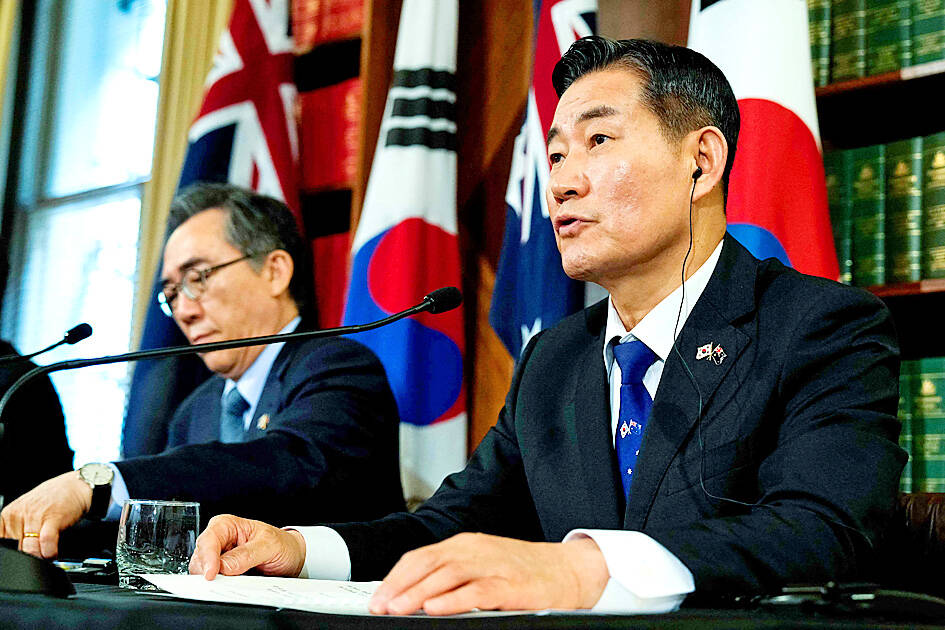South Korea is considering sharing advanced military technology with the US, the UK and Australia through the so-called AUKUS partnership, South Korean Minister of National Defense Shin Won-sik said yesterday.
The possibility was discussed during two days of meetings between South Korea and Australia’s defense and foreign ministers that ended in Melbourne yesterday, Shin said.
The US and the UK in 2021 agreed to provide Australia with a fleet of submarines powered by US nuclear technology under the AUKUS agreement to counter a growing military presence from China. AUKUS is an acronym for Australia, the UK and the US.

Photo: AFP
The countries could become involved in cooperation on a wider range of security technologies including artificial intelligence, electronic warfare and hypersonic systems through what is known as AUKUS Pillar II.
Shin welcomed South Korea’s invitation from the three AUKUS partners.
“We do welcome that AUKUS members are considering [South] Korea as an AUKUS Pillar II partner and Korea’s defense science and technology capabilities will contribute to the peace and stability of the development of AUKUS Pillar 2 and regional peace,” Shin said.
Japan is also moving toward formal talks to become part of AUKUS Pillar II’s technology development and sharing.
Australian Minister for Defense Richard Marles welcomed South Korean efforts to build on its relationship with Japan, which along with Australia, the US and India form a security dialogue known as the Quadrilateral Security Dialogue.
“We see this is a very, very positive step forward in the strategic landscape of the region and represents a huge opportunity for Australia to engage with both [South] Korea and Japan,” Marles told reporters.
“[South] Korea and Australia are working together to uphold the rules-based order within our region and, in fact, within the world,” Marles added.

SECURITY: As China is ‘reshaping’ Hong Kong’s population, Taiwan must raise the eligibility threshold for applications from Hong Kongers, Chiu Chui-cheng said When Hong Kong and Macau citizens apply for residency in Taiwan, it would be under a new category that includes a “national security observation period,” Mainland Affairs Council (MAC) Minister Chiu Chui-cheng (邱垂正) said yesterday. President William Lai (賴清德) on March 13 announced 17 strategies to counter China’s aggression toward Taiwan, including incorporating national security considerations into the review process for residency applications from Hong Kong and Macau citizens. The situation in Hong Kong is constantly changing, Chiu said to media yesterday on the sidelines of the Taipei Technology Run hosted by the Taipei Neihu Technology Park Development Association. With

‘FORM OF PROTEST’: The German Institute Taipei said it was ‘shocked’ to see Nazi symbolism used in connection with political aims as it condemned the incident Sung Chien-liang (宋建樑), who led efforts to recall Democratic Progressive Party (DPP) Legislator Lee Kun-cheng (李坤城), was released on bail of NT$80,000 yesterday amid an outcry over a Nazi armband he wore to questioning the night before. Sung arrived at the New Taipei City District Prosecutors’ Office for questioning in a recall petition forgery case on Tuesday night wearing a red armband bearing a swastika, carrying a copy of Adolf Hitler’s Mein Kampf and giving a Nazi salute. Sung left the building at 1:15am without the armband and apparently covering the book with a coat. This is a serious international scandal and Chinese

A US Marine Corps regiment equipped with Naval Strike Missiles (NSM) is set to participate in the upcoming Balikatan 25 exercise in the Luzon Strait, marking the system’s first-ever deployment in the Philippines. US and Philippine officials have separately confirmed that the Navy Marine Expeditionary Ship Interdiction System (NMESIS) — the mobile launch platform for the Naval Strike Missile — would take part in the joint exercise. The missiles are being deployed to “a strategic first island chain chokepoint” in the waters between Taiwan proper and the Philippines, US-based Naval News reported. “The Luzon Strait and Bashi Channel represent a critical access

COUNTERINTELLIGENCE TRAINING: The ministry said 87.5 percent of the apprehended Chinese agents were reported by service members they tried to lure into becoming spies Taiwanese organized crime, illegal money lenders, temples and civic groups are complicit in Beijing’s infiltration of the armed forces, the Ministry of National Defense (MND) said in a report yesterday. Retired service members who had been turned to Beijing’s cause mainly relied on those channels to infiltrate the Taiwanese military, according to the report to be submitted to lawmakers ahead of tomorrow’s hearing on Chinese espionage in the military. Chinese intelligence typically used blackmail, Internet-based communications, bribery or debts to loan sharks to leverage active service personnel to do its bidding, it said. China’s main goals are to collect intelligence, and develop a